This article was medically reviewed by Luba Lee, FNP-BC, MS and by wikiHow staff writer, Jessica Gibson. Luba Lee, FNP-BC is a Board-Certified Family Nurse Practitioner (FNP) and educator in Tennessee with over a decade of clinical experience. Luba has certifications in Pediatric Advanced Life Support (PALS), Emergency Medicine, Advanced Cardiac Life Support (ACLS), Team Building, and Critical Care Nursing. She received her Master of Science in Nursing (MSN) from the University of Tennessee in 2006.
There are 12 references cited in this article, which can be found at the bottom of the page.
This article has been viewed 92,421 times.
If you've been told you have low sperm motility, you may be wondering how to make your sperm faster to increase your chances of conception. The best way to improve sperm health is to improve your diet and make healthy lifestyle changes. For example, taking supplements and cutting back on alcohol are a few simple things you can do. If you and your partner are still struggling to conceive after 1 year, talk with your doctor about medical options to increase sperm motility.
Steps
Improving Your Diet
-
1Eat a diet of healthy, whole foods. Consume several small meals that include fruits, vegetables, whole grains, lean meat or protein, and dairy. Eating a variety ensures that you get numerous vitamins, minerals, and antioxidants that can naturally help increase sperm motility.[1]
- Limit the number of processed foods you eat since these are high in sodium, refined sugar, and fats.
- Avoid drinking alcohol since this could reduce your sperm motility.
-
2Include foods that improve sperm health. If you're eating a variety of healthy foods, you're probably eating nutrients that improve your sperm. To be sure, include foods that are high in zinc and arginine. These will increase the amount and speed of sperm your body makes. Foods high in zinc and arginine include:[2]
- Seafood and shellfish such as oysters and herring
- Nuts and legumes such as chickpeas, beans, peas, and walnuts
- Lean beef, organ meats, turkey, and lamb
- Wheat germ
- Dairy
- Eggs
- Spinach, asparagus, broccoli, garlic, and carrots
- Bananas, pomegranates, and goji berries
Advertisement -
3Maintain a healthy weight. Use your height and weight to determine your body mass index (BMI). If your body mass index indicates that you're medically overweight or obese, your sperm may be poorer in quality and slower. Work with your doctor to figure a healthy body weight based on your BMI.[3]
- Research showed that a BMI of 25 or more reduced the amount and quality of sperm produced.
-
4Add a supplement that has zinc, vitamin C, carnitine, and arginine. Ask your doctor about adding a multi-vitamin supplement to your diet. Choose a supplement that contains zinc, vitamin C, carnitine, and arginine which studies show improve sperm motility.[4]
- At least 2,000 to 6,000 mg of vitamin C a day to prevent sperm from clumping together and slowing down.
-
5Reduce the amount of alcohol you drink. If you do drink alcohol, cut back on the amount you drink throughout the week. Research shows that drinking alcohol reduces the amount of sperm your body makes and decreases motility.[5]
- If you're unsure how much alcohol you can drink without it affecting your fertility, ask your doctor to recommend a weekly limit.
Making Lifestyle Adjustments
-
1Start exercising on a regular basis. Exercise is associated with a number of health benefits and can help improve sperm motility by regulating hormones and contributing to weight loss. Try to get at least 150 minutes of moderate aerobic exercise and 2 strength-training sessions during the week.[6]
- Moderate aerobic exercises include brisk walking, running, or bicycling. Strength-training sessions involve lifting weights to build muscle.
-
2Wear loose-fitting underwear to keep your testicles cool. Avoid wearing tight-fitting underwear and pants that keep fabric snug around your testicles. Instead, wear fabrics that will keep the testicles around 94 °F (34 °C) so they produce high-quality sperm.[7]
- If your workplace is hot or you spend a lot of time sitting down, take breaks to stand up and walk around where it's cool.
-
3Reduce your exposure to chemicals and toxins. Everyday products and equipment can release chemicals that increase your risk for fertility problems. Stop using or consuming the following products that can be harmful to sperm motility:[8]
- Plastic food storage that contains bisphenol A (BPA).
- Bleached paper products such as white coffee filters, toilet paper, and napkins.
- Chlorinated tap water and bleach.
- Foods that have been treated with or contain pesticides, herbicides, preservatives, and other man-made ingredients.
- Synthetic cosmetics, toiletries, and deodorants.
- Animal food products that contain synthetic hormones, such as chicken, beef, pork, and conventional dairy products such as cow’s milk.
- Tobacco products and secondhand smoke.
- Cell phone radiation[9]
-
4Protect your sperm by practicing safe sex. Use condoms if you have more than 1 partner or stay monogamous with an uninfected partner to reduce your risk for sexually transmitted infections (STIs). STIs such as gonorrhea and chlamydia can reduce fertility and sperm motility.[10]
- If you use lubrication during sex, choose a fertility-friendly lubricant (such as Pre-Seed) that's similar to the pH of the cervix or use a natural product such as canola oil or egg whites.
-
5Manage and reduce your stress. The stress of trying to conceive as well as everyday life events can reduce your sperm count and slow sperm motility. Fortunately, relaxing and eliminating stress can improve your sperm fertility. To feel more relaxed, try:[11]
- Meditation
- Deep breathing
- Physical exercise
- Sleeping
Getting Medical Assistance
-
1Stop taking medications associated with lower fertility rates, if possible. Certain medications such as calcium channel blockers, tricyclic antidepressants, anti-androgens, and anabolic steroids can cause fertility problems. If you are currently taking medications that affect sperm motility, speak to your healthcare provider about alternative treatments that won’t slow down or reduce your sperm count.[12]
- If you'll be starting chemotherapy or radiation therapy for cancer, ask your doctor about retrieving sperm before starting your courses of therapy. Then you could use the sperm for in-vitro fertilization at some point.
-
2Treat any underlying health conditions. Some health conditions can reduce your sperm count or slow the sperm down. Get a medical exam to diagnose any untreated conditions and follow your doctor's treatment plan. Sometimes, just treating the condition can improve the motility of your sperm.
- For example, if you have a urinary tract infection, the infection can slow down or reduce the amount of sperm you produce. Take antibiotics to treat the infection and your sperm should quickly improve.
-
3Ask your doctor to prescribe medication to improve sperm count. If you have a very low sperm count, talk with your doctor about taking hormones to improve your fertility. Remember to ask them about potential side effects. The doctor may prescribe:[13]
- Clomiphene citrate
- Serophene
- Follitropin alfa or gonal-F injections
- Human chorionic gonadotropin (hCG)
- Letrozole or anastrozole
- Exogenous androgens
-
4Consider in-vitro fertilization (IVF). If you and your partner have been trying to conceive for at least 1 year, talk with a fertility specialist about your options. With IVF, mature eggs from your partner will be extracted and joined with your sperm in a laboratory. The fertilized egg will be inserted into your partner's uterus where it will hopefully implant.[14]
- If your sperm is simply slow, the doctor may recommend intrauterine insemination (IUI) where your sperm is injected into your partner's uterus. If it's timed when your partner is ovulating, your partner might be able to conceive.
References
- ↑ https://www.medicalnewstoday.com/articles/320010.php
- ↑ https://www.medicalnewstoday.com/articles/320010.php
- ↑ https://www.medicalnewstoday.com/articles/320160.php
- ↑ https://www.ncbi.nlm.nih.gov/pubmed/15705374
- ↑ https://www.ncbi.nlm.nih.gov/pmc/articles/PMC3739141/
- ↑ http://www.cdc.gov/physicalactivity/everyone/guidelines/adults.html
- ↑ https://www.medicalnewstoday.com/articles/320160.php
- ↑ https://www.alive.com/family/6-ways-to-boost-male-fertility-naturally/
- ↑ https://pubmed.ncbi.nlm.nih.gov/33862271/
- ↑ http://www.mayoclinic.org/healthy-living/getting-pregnant/in-depth/fertility/art-20047584
- ↑ https://www.ncbi.nlm.nih.gov/pmc/articles/PMC3717046/
- ↑ http://www.mayoclinic.org/healthy-living/getting-pregnant/in-depth/fertility/art-20047584?pg=2
- ↑ https://healthcare.utah.edu/fertility/treatments/male-fertility-drugs.php
- ↑ https://www.mayoclinic.org/tests-procedures/in-vitro-fertilization/about/pac-20384716
About This Article
To increase your sperm motility, which improves its chances of fertilizing an egg, try eating foods that are high in zinc and arginine, such as seafood, lean beef, dairy, eggs, and bananas. In general, try to maintain a balanced diet that includes fruit, vegetables, whole grains, lean meat, protein, and dairy to make sure you get all the nutrients your sperm needs. If you drink alcohol, consider reducing the amount you drink, since alcohol can lower your sperm count. You should also do at least 150 minutes of aerobic exercise a week, like walking, running, or cycling, to improve your sperm motility and regulate your hormones. For more tips from our Medical co-author, including how to reduce stress in your life to improve your sperm motility, read on!

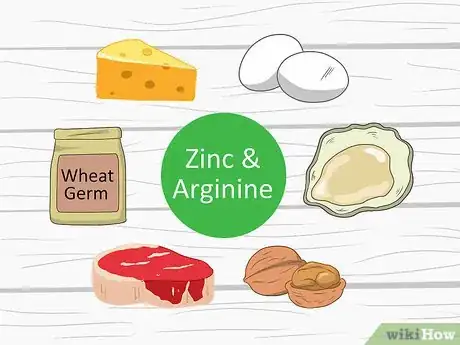

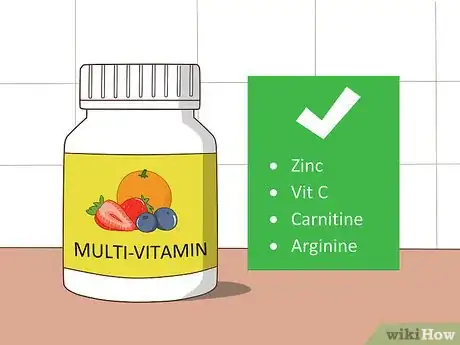






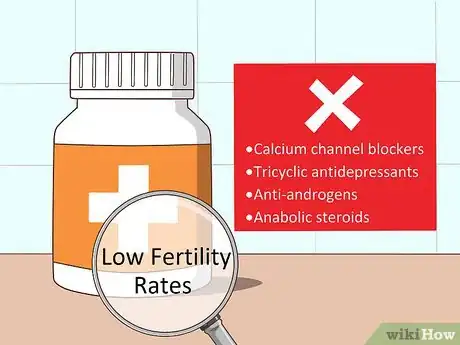

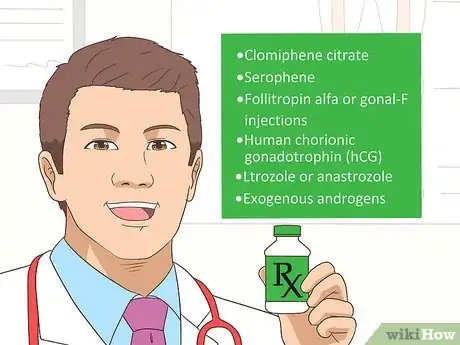
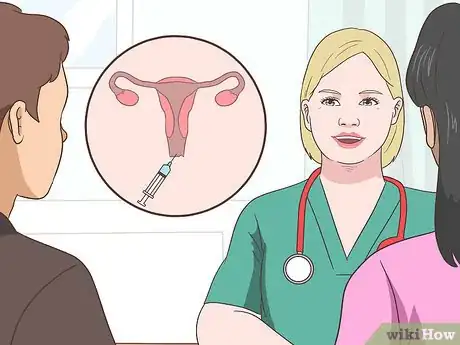

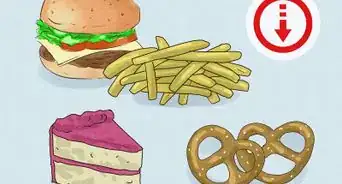




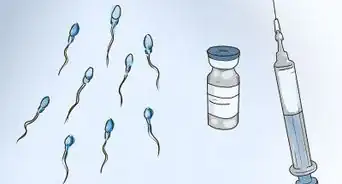


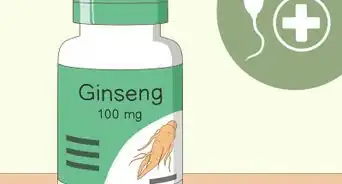















































Medical Disclaimer
The content of this article is not intended to be a substitute for professional medical advice, examination, diagnosis, or treatment. You should always contact your doctor or other qualified healthcare professional before starting, changing, or stopping any kind of health treatment.
Read More...